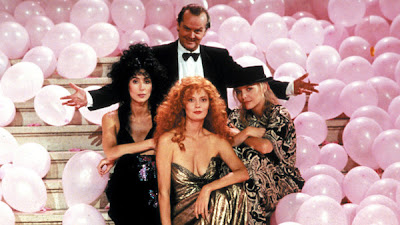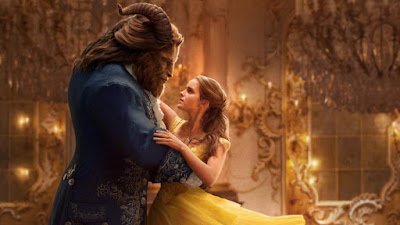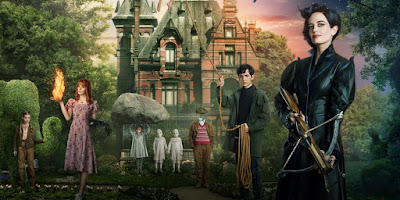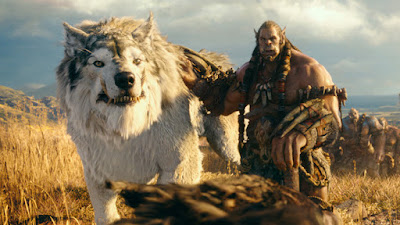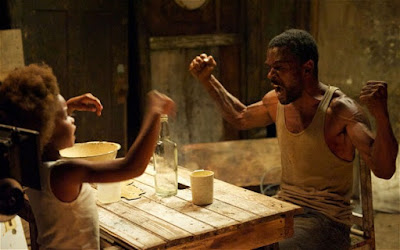Long ago in the alcoves of the purest childhood memories, a charming nanny fell from the sky over England and became a lynchpin for the ambitious daydreams of young moviegoers. Although five decades have come and gone since “Mary Poppins” instilled that impression and captivated many a heart, rarely does she escape the notice of those in the recent generations, who have stockpiled their own experiences as the film endures across all the traditional time barriers. It was perhaps always inevitable, therefore, that the legend would eventually inspire thoughts of a follow-up, especially given how eager the Disney brand is to repeat its own history. And now in the midst of a parade of live-action remakes and reboots comes “Mary Poppins Returns,” in which we are presented the opportunity to spend another two colorful hours in the company of an unassuming caregiver who whisks her subjects into the world of elaborate musical fantasy. It goes without saying that there was little possibility of anyone besting the great adventures of the first film, but the good news is that even cynics of this formula will leave the theater feeling thankful for the chance to engage with a delightful spectacle rather than a pointless retread.
Showing posts with label FANTASY. Show all posts
Showing posts with label FANTASY. Show all posts
Wednesday, January 23, 2019
Thursday, October 4, 2018
The House with a Clock in Its Walls / *** (2018)
The young hero of “The House with a Clock in Its Walls” is one of the more unfortunate examples of the literary trap we now know as young adult pathos. He adopts a trend that can be described as such: if you’re a prepubescent eccentric who engages better with daydreams then actual people, it’s inevitable for the story to make you the victim of immense grief before dropping you into a life-threatening adventure. And in the tradition of the displaced orphans of “A Series of Unfortunate Events,” poor Lewis Barnavelt arrives at the opening of the tale not eager or excited by what he is about to experience, but crippled by the horrific knowledge that his parents recently died and left him in the custody of a virtual stranger. How can he possible be roused to enthusiasm, then, by the strange and ambitious whimsy going about all around him? Are the likes of an eccentric uncle played by Jack Black and a female accomplice played by Cate Blanchet enough to undermine his sorrow? Or is the pain under the surface the sort that negates all the wonder and joy that ought to come with the discovery? A straight document of these events might contrast the of the scenario with the psychological disconnect of the characters, but what fun would that be when a world of magic possibilities is just waiting to be unleashed?
Monday, August 27, 2018
The Greatest Showman / **1/2 (2017)
Hugh Jackman is one of the great gifts of the modern movie experience, and “The Greatest Showman” may very well be the fullest expression thus far of his impeccable performance talents. Here is a film tailor-made for those theatrical sensibilities, full of color and song, engaging his deep need to entertain an audience in nearly every frame he possesses the screen. While some of that can be sourced to the power of the visuals – which certainly provide their own sense of wonder – it’s hard to imagine any other person standing in this role, with this much pep, and this sense of dedication. Legend speaks of the men and women who would sacrifice their own security just for the sake of inspiring the gleeful response of a viewer, and Jackman proves, well above his peers, that he is the pilot of a destiny to forever marvel those who come to share his company. Who could ask for more in these generic times, when entertainment is decided less by individual vision and more by collaborative illusions?
Saturday, August 4, 2018
"The Black Cauldron" Revisited
“Legend has it, in the mystic land of Prydain, there was once a king so cruel and so evil, that even the gods feared him.” The opening narration inaugurates the curse shrouding the fabled black cauldron, an object of such immense danger that its very mention instills dread in the hearts of commoners. Although centuries came and went while it lay dormant, obscured by the spells of defensive witches, a new enthusiasm has gripped the totalitarian forces of the Horned King, who pursues it with persistent determination. In his possession, the cauldron would unleash the frightening power of necromancy, allowing its possessor to raise an unstoppable army of dead soldiers, essentially making him immortal. And all of creation would succumb to this destructive curse, including those whose personalities necessitate the enthusiasm of the audience: a teenage adventurer who dreams of heroism, a clumsy bard, a distraught princess, a furry and inquisitive beast, a snarky sprite and an oracular pig, who also provides the key to discovering the whereabouts of the coveted relic.
Saturday, April 7, 2018
The Witches of Eastwick / *** (1987)
The solution to enduring the absurdity that is “The Witches of Eastwick” involves distancing yourself from any measure of logic. Here is a movie that invites an explosion of disbelief, assembled from pieces of a reality that looks as if it might have been plausible in the early stages. But to gaze at the screen any longer than a moment’s notice is to find the New England locales, the happy faces and the passive daily routines to be the cloak surrounding a supernatural fantasy – and a ludicrous one at that. In a way, George Miller depends on our trust in his ability to shed a light of purpose; after “Mad Max” made him a cool commodity in the eyes of nerd culture, it became obvious that he could make a long and successful career out of playing against convention. And somehow he manages to sustain that prospect even here, in a film that audaciously asks us to believe characters played by Cher, Susan Sarandon and Michelle Pfeiffer can not only dream up the same ideal love interest, but that each of them would be ok sharing him at a mansion just outside of town with little sense of jealousy or insecurity.
Thursday, January 4, 2018
Beauty and the Beast / ** (2017)
Once upon a time, in a faraway board room of a money-hungry movie studio, someone voiced an idea that signaled the beginning of the end of original concepts: “let’s take all of our animated pictures and remake them into live action ones!” Although the undertaking might have inspired intriguing subtexts, the standard remained depressingly derivative, inevitably leading to a cluster of endeavors that rarely expanded the imaginations of their viewers. And thus Disney gave voice to executives whose primary motivation was dollar signs, an impulse that paved the way for routine retellings of “Alice in Wonderland,” “Cinderella” and “Pete’s Dragon.” In rare instances, granted, were endeavors that added interesting spins to their premise (“Maleficent”) or even surpassed rather flawed sources (“The Jungle Book”). But when the decision to retool “Beauty and the Beast,” one of the finest of all animated achievements, came down the pike, the core of this capitalist motivation seemed no longer able to masquerade behind plausible convictions. What could today’s artists, really, do to a story that had seemingly been perfected in hand drawings? Was something undiscovered waiting among all those talking pieces of furniture? If anything at all can be said of the live-action rendition beyond a few isolated touches of skill, it’s that the director, Bill Condon, has effectively produced the first movie musical for the “Glee” generation. And that is not something to be proud of.
Monday, January 1, 2018
The Shape of Water / *** (2017)
Eventually all moviegoers – even the most open-minded – will arrive at a moment that challenges their ability to tolerate arduous realities. One of mine came during the second act of “The Shape of Water,” when the lead character played by Sally Hawkins shares a detail with Octavia Spencer about the anatomy of the sea creature she has rescued. The preceding scene already leaves little to the imagination; as the camera rests at the entrance of her bathroom, she walks seductively towards the animal, disrobes and closes the shower curtain as they come to a very suggestive embrace. For most there is no possibility of mixed interpretation, and yet I was fully content to overlook what transpired for the sake of riding the film’s momentum. But Guillermo del Toro, the movie’s director, refuses to dismiss the discomfort with glossed over platitudes. That’s never been his style. No, he allows the event to become a topic of lighthearted exchange between she and her friend, who is marveled not only by the idea that this beast even has a penis hidden behind that thick mound of his pubic region, but apparently a very satisfying one. Their exchange leads to a strange chuckle, which the audience nervously joins in on. And there I am sitting in the dark, fidgeting uncomfortably, feeling as if I had been submerged in water that was brought to a very slow boil.
Monday, December 4, 2017
Coco / **** (2017)
Any number of recent mainstream cartoons that find their way to theaters are in some way about the importance of family values, but Pixar’s “Coco” is the first in a while that is truly sincere about the concept. Never is there a sense while watching it that artists or filmmakers are weaving an illusion that is at the service of a shallow impulse, nor does it inspire the urge in us cynics to pick apart the formula in secondary exercises (a behavior, I willingly admit, that I used in Disney’s recent “Moana”). Like a drill plunging to the depths of a rich reservoir, here is a wonderful little film that finds a powerful source of inspiration while others barely scratch the surface of their wisdom, allowing many of us to forget we are hardened adults diminished by experience. For a precious few minutes I was not merely a movie enthusiast – I was a kid entranced by a spell, in a place of splendor and sensation, joining characters on a quest that felt created by magic rather than the pens of ambitious scribes. And if the feeling remains true that the studio’s output is as rewarding for adults as it is for children, their latest strikes an even more elusive chord: one that transports the oldest of codgers back to a time when our innocent young eyes were starved for exciting adventures.
Sunday, January 8, 2017
"Princess Mononoke" Revisited
“Princess Mononoke” begins with a voice that throbs over the chords of an ominous score, heralding the arrival of a menacing reality. The scene is the edge of a lush forest, fogged over, and its docile facade is jarred from silence by the breaking of branches and the flight of frightened birds. What lurks among the tall trees is not man but rather the monster man has created, a former deity of nature that has withered under corruption and now seeks to lay waste to those in his path. The peaceful denizens of a nearby village are triggered into frenzy by its dismaying appearance – a massive boar covered in an armor of maggot-like parasites – but among them is a young man whose face never seems to engage in the nightmarish rampage. It is his destiny to fight the creature and ultimately be cursed by it, leading him towards quests of intricate mystery that will blur the lines of fable and reality in ways that are rarely told (or at least done so with such precision). Those opening impulses exist above the sphere of ordinary exposition; the fact that they occur at all in an animated film is cause to contemplate the elasticity of movie genres, especially in a time when most are geared towards much simpler tastes.
Wednesday, November 30, 2016
Fantastic Beasts and Where to Find Them / **1/2 (2016)
The most elusive of assets in any yarn about whimsical adventure is a writer’s confidence in the material: the assuredness that words and actions have profound ramifications towards a story arc and its characters. Those that lack such an assertion usually become lost in their own inspiration, and rarely offer any sort of significance other than vague interludes of wonder. The new “Fantastic Beasts and Where to Find Them,” a film within the “Harry Potter” universe that arrives just as the demand for franchise consistency has awoken in the hearts of moviegoers, is of the latter distinction – certainly ambitious in scope and filled with images as enchanting as they are sharp, it rarely seems to know what it has in mind for the ambitious events that are destined to play out. Instead there are only rough connotations for us to rely on; it tells the story of Newt (Eddie Redmayne), a former student of Hogwarts who has arrived in New York carrying a suspicious briefcase filled with magical creatures from the wizarding world to, I suppose, research their bizarre behavior without overreaching influences. Unfortunately, chaos ensues in the presence of an unknowing witness and Newt’s creature are set free in the city, just as the divide between human and magic worlds runs dangerously blurred.
Thursday, November 24, 2016
Doctor Strange / ***1/2 (2016)
There is a wide array of sensations one is apt to experience while watching the new “Doctor Strange,” but the most inexplicable of the arsenal is an unflinching sense of plausibility – the idea that something so seemingly absurd or above the trajectory of audience absorption can feel so thoroughly believable when spied through zealous camera lenses. A basic reading of a plot synopsis certainly contradicts that assumption, and no wonder: the story, about a brilliant doctor who is crippled in an accident, goes on a mystical retreat, discovers astral projection and literally learns how to bend time seems like nothing more than self-indulgent fantasy. But Scott Derrickson, the motivated filmmaker behind Hollywood’s latest excursion into the pages of colorful comic books, takes an approach far more cognizant than most others would, and what emerges on screen far exceeds the cynical expectations of what we routinely offer this genre. Certainly the details have a familiar air to them – the visuals echo “Inception,” the premise recalls elements of “Batman Begins” and the characters are reminiscent of those contained in “The Matrix”, for example – but so infrequently do such things come together in the service of such an engrossing story, much less a mere suggestion of intrigue.
Sunday, November 6, 2016
Miss Peregrine's Home for Peculiar Children / *** (2016)
“Miss Peregrine’s Home for Peculiar Children” is not the sort of excursion that is alien to the behaviors of the eccentric Tim Burton, but unlike a plethora of the director’s recent output it sticks to you with a certain romanticized clarity, as if plucked from some untapped corner of his exhausted imagination. Some credit can be attributed to sharpness of the visuals and even the dexterity of the characterizations, sure, but the most certain of its qualities rests in the writing; based on a popular young adult novel by Ransom Riggs, here is a story tailor-made for the sensibilities of a dreamer, enriched by a consistency in the details that leave their viewers fascinated, shocked and at times enamored. Yet even enthusiasts of the Burton doctrine might find themselves bewildered enough in those realities to stand back in charmed perplexity – as much as they are likely to be thankful the opportunity to be once again swept up in a rewarding adventure, some will be inclined to attach footnotes. A filmmaker this gifted and this pointed in his observations is too precious a gift to be a slave to formula, and yet “Peregrine” represents a departure from that trend rather than the persistence of his individualism.
Monday, August 15, 2016
Ghostbusters / *** (2016)
Dialogue was one of the key strengths of Ivan Reitman’s immortal “Ghostbusters,” and when contrasted against special effects that were destined to become dated paradigms of the past it resisted the contextual erosion of most mainstream comedies. To hear the characters discuss their problems now is to sense two certainties: 1) the thorough skill of its writer, Harold Ramis, who was perceptive of human behavior beyond the momentary jabs of a punchline; and 2) the realization that the characters were responding to the material exactly as they needed to, regardless of how funny or whimsical their approach may not always appear. That’s because they were smart and had the foresight to explain themselves in the logical circles they routinely found themselves trapped in, where most would ordinarily be reduced to shrieks of terror or displaced from coherence. No one – least of all the Ghostbusters themselves – knew exactly how to regard a world where they were being consciously haunted by a series of bizarre specters, but to lose your sense of humor in the thick of all things weird might have been more damaging to one’s focus. No satisfactory resolution would have occurred with this sort of premise if those at the helm weren’t driving through it with a keen sense of awareness.
Wednesday, June 22, 2016
Alice Through the Looking Glass / *** (2016)
Strange it must be to have a vivid imagination in the charge of a puritan social class. Just ask young inquisitive Alice: a wild spirit whose existence seems to tug at cultural restraints with certain stubbornness, she continues to persist in literary circles as a symbol of free thinking, a notion made all the more relevant since she happens to be a young girl in the era of impenetrable male ego. But what creator Lewis Carroll did to her over the course of two tripped out narratives says just as much about the curse of daydreams as it does about their virtue, even for an archetype. The farther one is willing to wander into the fantasy, the more inevitable the torment. And so Carroll’s notorious “Wonderland” stories dwell in the recess of school memories like awkward encounters with foreboding superiors. Some continue to find delight in the convoluted puzzles of young Alice’s adventures, but as a child I was swept under the tow of their underlying masochism; it’s as if the pages played like records of extreme aversion therapy, detailing all the scary and eccentric things that a girl could encounter without much in the way of joy to drive them.
Tuesday, June 14, 2016
Warcraft / *1/2 (2016)
A great many brush strokes of creative dexterity have gone into building the universe of Blizzard’s treasured Warcraft saga, but few of them ever rise to the surface in the first live action movie about the popular game series. How do I know that’s the case? Because I, dear reader, have been an avid player (and reader) of the notorious PC phenomenon for nine years – indeed a treasured pastime that has ebbed and flowed with consistent prominence nearly as much as going to the movies has in recent times. Never one to be loyal to a hobby for longer than a few entertaining months, however, the ongoing hold of “Warcraft” is as bewildering to me as it might be to those unaware of my personal pleasures. It persists like a story you play with in your mind. And that is not an isolated feeling, otherwise the necessity to take the concept into the footholds of cinematic interpretation would have never gone this far. Couple that with the dueling perspectives of video game-to-film trends (seldom successful and usually disastrous) and a reputable director standing at the helm (Duncan Jones, the master behind “Moon”), and what arrives in theaters isn’t so much a standard action flick as it is a predestined clash between cinema enthusiasts and players of the game, both of whom will no doubt be measuring the final result with entirely different gauges.
Thursday, January 7, 2016
Hugo / **** (2011)
Upon first impression, the colorful world of a young boy living inside a Paris train station hardly seems like the sort of material that would come to the attention of Martin Scorsese. Traditionally driven by the cold realities on the mean streets of the big city, his is a pattern of more serious sensibilities, and not at all brought to fruition by the simple pleasures or characters possessing mere hope and confidence. But then there is a revelation of stirring importance that rises to the peak of our awareness, and a critical connecting point emerges. Reflecting his impassioned crusade for the continued preservation of film heritage, the story ultimately becomes a fable about one such discovery (and certainly one of the most enriching) falling into the hands of inquisitive youths. So harmonious are those links that once our eyes awaken to the truth, alternate scenarios feel like nightmares, even betrayals. What other filmmaker – dare we say even the most visual or artistic – could have shown so much love for a subject this precious, or enveloped it in such a passionate embrace of careful technical values and stirring emotional undercurrents?
Monday, November 30, 2015
The Hunger Games: Mockingjay Part 2 / *** (2015)
13 poverty-stricken districts stand united against the fascist endeavors of their totalitarian government, but only one face among them rouses the populace to the pinnacle of rebellious enthusiasm. Her name is Katniss Everdeen (Jennifer Lawrence), and over the course of two years of dangerous encounters with manipulative politicians and blood-hungry tributes, she has stood firm and defiant against a system that sought to dispose of her, and after besting her superiors in an elaborate game of slaughter they helped to create, her survival is a testament to the buried courage of a circumscribed class system. Did she open their eyes to the possibilities of hope, or were her actions merely a reminder that they had become submissive to the trials of their oppressors? Both thoughts consider the sources without identifying the certainty, but no bother: they have now come to a moment of strategy that insists they must march against the Capital in violent protest, otherwise they are doomed to a slow and painful fate that upper class sensationalists would only be too eager to exploit in front of the cameras.
Monday, October 19, 2015
Crimson Peak / **1/2 (2015)
Literary theory dictates that ghosts must exist for one of two primary reasons: to harvest negative energies or to herald important warnings, both usually directed towards ambivalent onlookers. The foundation of their existence can vary depending on a story’s tone, but almost always the root causes are the same –violent tragedies have left them in a state of otherworldly confusion. One of the more humorous ironies is that few characters contemplate those possibilities when they come face to face with such apparitions, often assuming that they are capable of only the worst fates. Perhaps the principles of some modern interpretations have violated those quintessential rules – the more seasoned architects believed that ghosts can only haunt, not attack or harm – but who is to say they could really be any worse than the living beasts that walk among us already? The reality is that they are byproducts of a world with much more menacing energies, and their refusal to leave is indicative of more singular agendas; they must endure for the sake of either redemption of vengeance, lest they be doomed to walk through eternity in a fog of aimlessness and despair.
Wednesday, September 30, 2015
Mad Max / *** (1979)
In awe of George Miller’s recent “Mad Max: Fury Road” – and the precision of craftsmanship that went into its ambitious chase sequences – I found it essential to return to the first source of that inspiration, a small and inexpensive movie that began life as a shell for one director to pour his distinct vision into. The first endeavor about the wandering avenger Max – then an agent of justice who had yet to endure his inevitable personal tragedies – was a broad and coarse character study without the refined world that we recognize as post-apocalyptic (though it did, in fact, open after the end of a devastating war). What separated it from a host of other law-enforcer-turned-punisher vehicles of that time, however, came down to a principal of technical values; it was not one of those pictures that blurred the coherence of a story in the jumbled images of nonsensical action, but one that celebrated the danger of the open road in photography with impeccable clarity. The majority of the picture seems to exist as an open protest of the time’s shoddy trend, and there is not a moment where we suspect the man handling the cameras isn’t willing to be right there in the middle of the chaos along with his subjects, potentially in the hands of incredible danger. In those first images are the seeds that would go on to become the elaborate shows of the later films of this series, arguably brought to a furor of artistic perfection in the most recent.
Monday, July 13, 2015
Beasts of the Southern Wild / **** (2012)
The earliest of many discoveries occurs during the first set of establishing shots, which utilize handheld camerawork and are coarse, soiled and un-romanticized depictions of a ransacked social climate. They suggest the bleakest of realities, a life of paralyzing limitations. And then we meet the heroine, a plucky and adventurous young girl who contradicts those possibilities with more singular outlooks. She lives with her dad on a plateau in a Louisiana bayou that is separated from the mainland by levees, where houses are made out of the remnants of damaged structures, and belongings scattered across the high grasses act as reminders of memories lost to the unforgiving elements. They, like the lowly neighbors they keep company with in a world they call “the Bathtub,” are the forgotten faces of poverty. And yet none of that ever seems to phase the worldly imagination of this inquisitive child, who passes her time by watching on with earnest enthusiasm as her elders celebrate their fortune rather than mourn it (“Up in the dry world,” she says, “they got none of what we got”). It is a value clearly instilled by her father, but even his guidance is no match for a mind that runs so wild, and with such unrestrained purity.
Subscribe to:
Posts (Atom)





